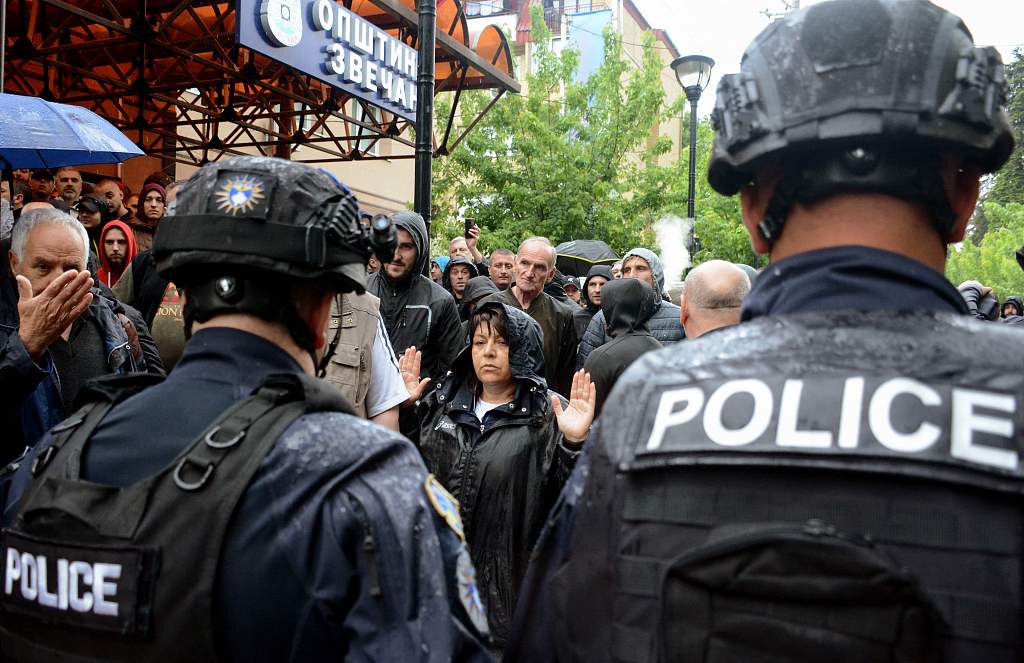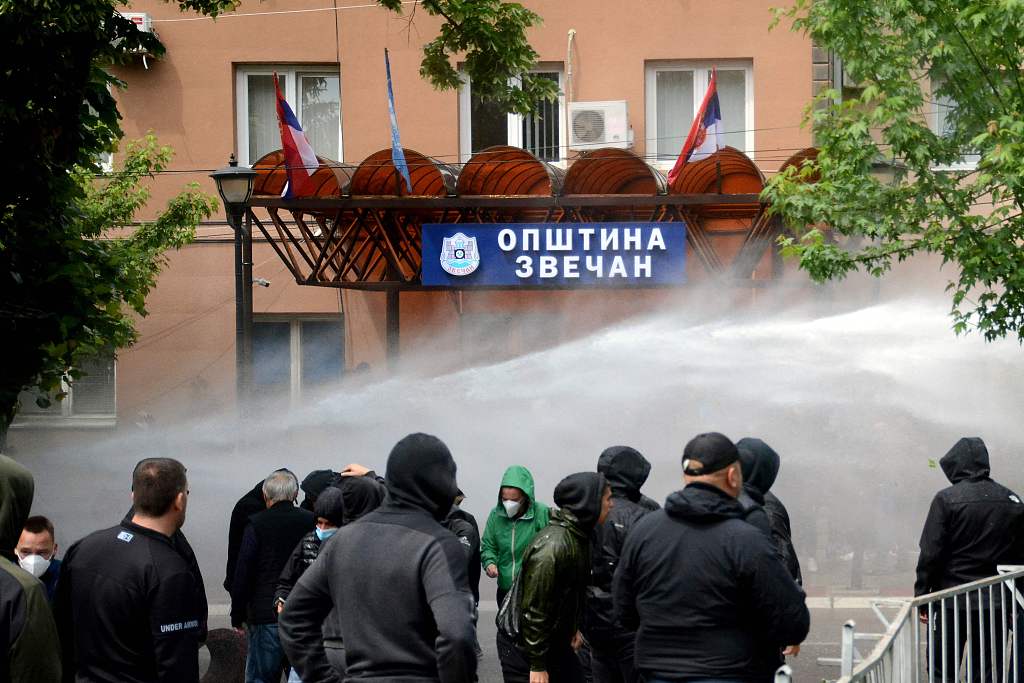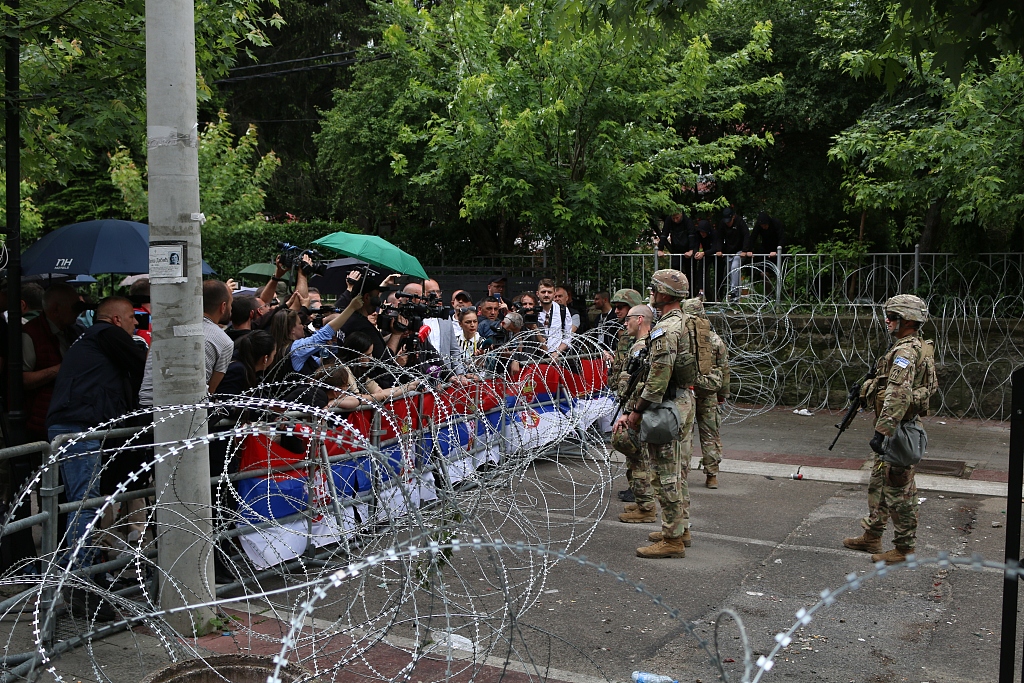
Kosovo riot police secure a municipal building after dispersing protestors demonstrating after police helped install ethnic Albanian mayors following controversial elections in the Serb-majority town of Zvecan, May 26, 2023. /CFP
Kosovo riot police secure a municipal building after dispersing protestors demonstrating after police helped install ethnic Albanian mayors following controversial elections in the Serb-majority town of Zvecan, May 26, 2023. /CFP
Tensions in northern Kosovo have flared anew following a disputed local election.
With clashes between ethnic Serbs and ethnic Albanian-lead government's police, there are fears the violence could escalate or become renewal of the Kosovo War of the late 1990s that claimed over 10,000 lives and left more than 1 million homeless.
What's the contention?
At the end of the Kosovo War in 1999, Kosovo, a Serbian province dominated by ethnic Albanians, was placed under transitional UN administration by the Security Council.
In 2008, Kosovo unilaterally declared independence from Serbia, which rejects it and considers Kosovo as its own province.
Kosovo's independence is partially recognized by the international community. Countries including Russia, China and five European Union nations – Spain, Romania, Slovakia, Greece and Cyprus – have sided with Serbia.
The deadlock then has kept tensions simmering between ethnic Albanians-dominated Kosovo authority and the 50,000 minority Serbs living in the region.
Since last year, Serbs mostly living in northern Kosovo have been boycotting the local institutions as a way to protest any form of violence against them, as well as the mandatory use of Kosovo IDs, travel documents and car license plates in the area.

Kosovo riot police use water cannon to disperse Serbs gathered in front of a municipal building in the Serb-majority town of Zvecan, May 26, 2023. /CFP
Kosovo riot police use water cannon to disperse Serbs gathered in front of a municipal building in the Serb-majority town of Zvecan, May 26, 2023. /CFP
Why is violence flaring up again?
Kosovo's Serbs boycotted the April 23 local elections in four municipalities in northern Kosovo, allowing ethnic Albanian parties to take control of local administrations despite a turnover of less than 3.5 percent.
On May 26, police in Kosovo tear-gassed small groups of ethnic Serbs who were trying to prevent a newly elected ethnic Albanian mayor from entering his office in the majority Serb town of Zvecan. The vehicles of Kosovo's special police forces also surrounded the municipal buildings in other cities in northern Kosovo, including Kosovska Mitrovica, Leposavic and Zubin Potok. Local Serbs responded to these actions by setting up roadblocks.
Following the protest clashes, Serbian President Aleksandar Vucic signed an order to raise the combat readiness of the units of the Serbian Armed Forces to the highest level, ordering them to move in the direction of the administrative line with Kosovo and Metohija.
On May 29, over 50 civilians and more than 40 North Atlantic Treaty Organization (NATO) soldiers were injured in a clash between NATO's Kosovo Force (KFOR) and Serb protesters in Zvecan as the KFOR were trying to disperse a group of Serbs who protested in front of the Zvecan municipality building.
How deep is the ethnic conflict?
Kosovo became part of the Kingdom of Serbia in the early 13th century, with a mixed population of ethnic Albanians, Serbs and Vlachs. The Nemanjic dynasty made Kosovo the spiritual heartland of Serbia, giving lands to the Orthodox Church and building monasteries that still stand today.
Many Serbs left over the five centuries after the Ottoman Empire defeated Serbs under Prince Lazar in the 1389 Battle of Kosovo, while ethnic Albanians grew in number. Mutual expulsions and migrations to and from neighboring Albania in the early 20th century changed Kosovo's ethnic makeup.
Ethnic Albanian rebels in Kosovo launched a rebellion in 1998 to rid the country of Serbian rule. Without the previous authorization of the UN Security Council, NATO intervened to stop Serbia's onslaught by beginning 78-day long air strike in March 1999.
The UN Security Council adopted Resolution 1244 in June 1999, placing Kosovo under interim UN administration, performed by the UN Interim Administration Mission in Kosovo (UNMIK). It also authorized international peacekeeping force with substantial NATO participation in Kosovo.

Personnel of the Kosovo Force stand alert amid protests in Zvecan, May 31, 2023. /CFP
Personnel of the Kosovo Force stand alert amid protests in Zvecan, May 31, 2023. /CFP
What do the two sides say?
Vucic urged Kosovo to withdraw its special police units and the four mayors from the region as a condition for preserving peace.
Kosovo's leader Vjosa Osmani said she's prepared to consider possible fresh local elections but urged the Serbian side to stop encouraging ethnic Serbs in the region to boycott the poll.
What does international community say?
NATO chief Jens Stoltenberg last week said that the alliance was prepared to deploy more troops to Kosovo to quell the violence, adding that the first 700 reinforcement troops were on the way there.
French President Emmanuel Macron and German Chancellor Olaf Scholz last Thursday met Vucic and Osmani on the sidelines of the European Political Community summit in Moldova, urging Kosovo to allow new elections in four northern municipalities.
U.S. Secretary of State Antony Blinken in a statement said Kosovo's actions "have sharply and unnecessarily escalated tensions," and called on all sides to "refrain from any further actions that will inflame tensions and promote conflict."
Russian Foreign Minister Sergey Lavrov described the situation in Kosovo as "worrisome," blaming the U.S. and NATO for claiming dominance in that part of the world.
Chinese Foreign Ministry said that China supports Serbia's endeavor to safeguard sovereignty and territorial integrity, opposes unilateral actions by the temporary institutions in Pristina and calls on it to perform its duty of establishing an association/community of Serb majority municipalities.
(With input from agencies)